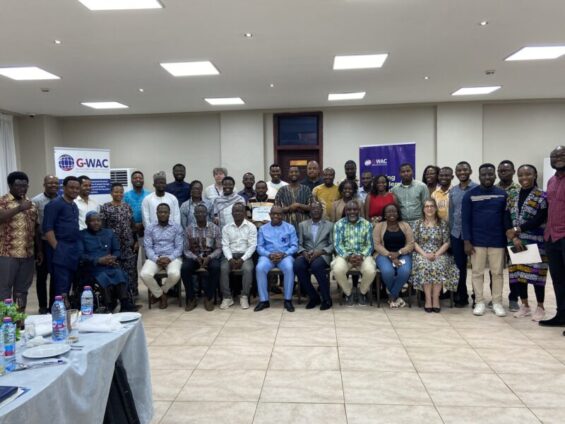Thirty researchers in global health across the West African subregion are receiving training on Modelling for Pandemic Preparedness and Response from the German-West Africa Center for Global Health and Pandemic Prevention (G-WAC) at the Kwame Nkrumah University of Science and Technology (KNUST).
The course, which serves as a launch of a network of mathematical modelers, aims to develop tools to respond to pandemics in Africa and the world at large.
The Director of the German-West Africa Center for Global Health and Pandemic Prevention (G-WAC), Dr. John Amuasi, stated the importance of this training.
"Pandemics are multi-factorial, and many things influence pandemics," he said. "Therefore, it is important that researchers of pandemics have a broad training in multi-, inter-, and transdisciplinary fields. They need to know who to bring on board to answer questions that will help us either prevent pandemics or build responses appropriately."
He also noted some expectations for the course.
"The expectation is for participants to take the knowledge they've gained to their various countries and institutions and apply it," he said. "They should be able to understand how pandemics happen, how they progress, and the best way we can prevent the negative outcomes of these outbreaks."
"This is the beginning of something we think will blossom continent-wide," he added. "In order to have health professionals who appreciate modeling and can at least conduct basic modeling, we need to provide critical information that modelers will need to develop and utilize models that will be useful in pandemic prevention."
This short course provides transdisciplinary education and training while fostering networking and collaboration for global health researchers.
Provost of the College of Health Sciences at KNUST, Professor Christian Agyare, believes the training will help the continent be better prepared for pandemics.
"I believe now, with what we've achieved in nearly four years, the continent will be better prepared to face any pandemic compared to COVID-19," he said. "I believe the center (G-WAC) is working towards its mandate and hopes to expand the program and then the participants who come from all over the continent will have the skills and knowledge required to help in global health and pandemic prevention."
The course is funded by the German Academic Exchange Service (DAAD).
Latest Stories
-
Queenmother calls on President-elect Mahama to appoint more women in his government
10 minutes -
Atletico Madrid beat Barcelona to go top of La Liga
28 minutes -
Usyk breaks Fury’s heart with points win in rematch
30 minutes -
Ghana-Russia Centre to run Russian language courses in Ghana
6 hours -
The Hidden Costs of Hunger: How food insecurity undermines mental and physical health in the U.S.
7 hours -
18plus4NDC marks 3rd anniversary with victory celebration in Accra
9 hours -
CREMA workshop highlights collaborative efforts to sustain Akata Lagoon
9 hours -
2024/25 Ghana League: Heart of Lions remain top with win over Basake Holy Stars
11 hours -
Black Queens: Nora Hauptle shares cryptic WAFCON preparation message amid future uncertainty
11 hours -
Re-declaration of parliamentary results affront to our democracy – Joyce Bawah
11 hours -
GPL 2024/25: Vision FC score late to deny Young Apostles third home win
11 hours -
Enhancing community initiatives for coastal resilience: Insights from Keta Lagoon Complex Ramsar Site Workshop
11 hours -
Family Health University College earns a Presidential Charter
12 hours -
GPL 2024/25: Bibiani GoldStars beat Nsoatreman to keep title race alive
12 hours -
GPL 2024/25 Bechem United keep title hopes alive with narrow win over FC Samartex
12 hours

